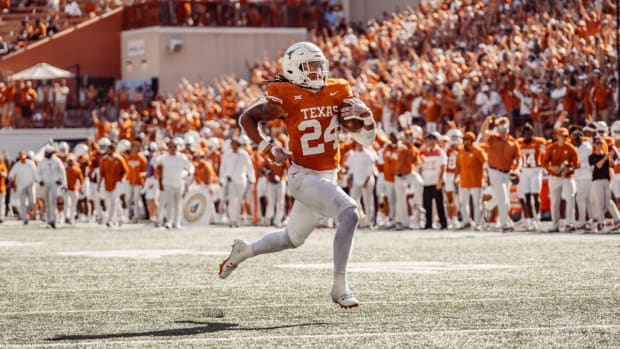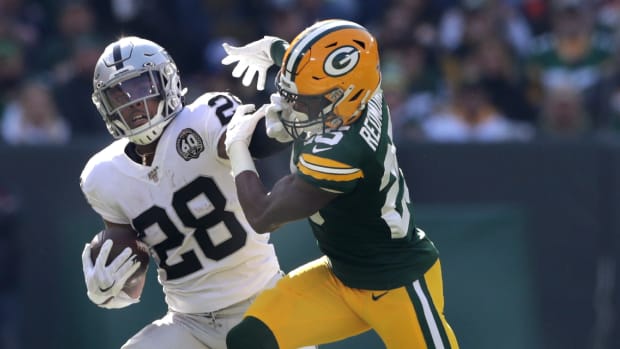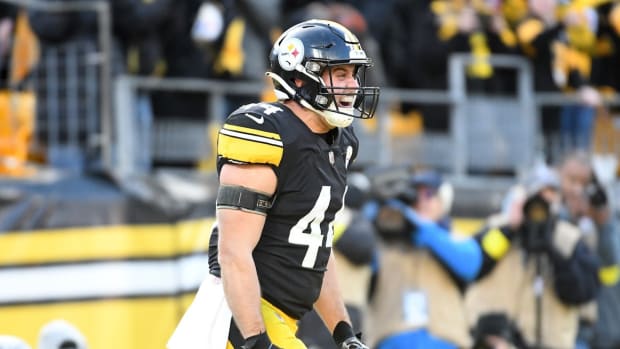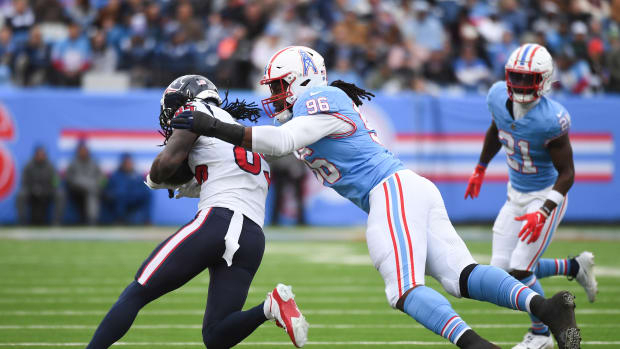Flacco, Eli have turned Super Bowl predictors upside down
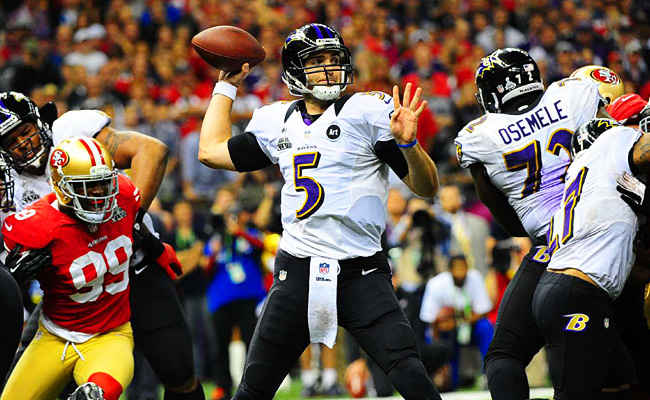
Ravens QB Joe Flacco finished with 11 touchdown passes and no interceptions over four playoff games.
Al Tielemans/SI
Baltimore Ravens quarterback Joe Flacco helped prove that there's a very simple formula for building a champion in today's NFL.
First, your quarterback should declare himself elite at the start of the season, much to the jeers of a doubting pigskin public. He should then bumble his way through an uninspiring regular season for an underachieving team, only to suddenly turn it on with a dashing four-game run of excellence in the postseason. Then, only then, should he cap it off with a big MVP performance in the Super Bowl.
Sounds easy, right?
It worked for New York Giants quarterback Eli Manning, who declared himself elite at the start of the 2011 season and ended up MVP of Super Bowl XLVI. And it worked for Flacco, who declared himself the best in the game at the start of the 2012 season and ended up MVP of Super Bowl XLVII.
Flacco, like Manning twice before him, did not play particularly well in the regular season, certainly not by the standards of the top quarterbacks in today's game (22 TDs, 10 INTs, 87.7 rating).
His slightly above-average effort was reflected in Baltimore's slightly above average record (10-6). Passing efficiency and victories move in almost perfect lockstep throughout NFL history and Flacco's rather humble numbers were a big reason for Baltimore's humble record.
Conversely, the Ravens were suddenly a dangerously hot team when his performances skyrocketed in the postseason.
Ray Lewis got plenty of credit for his emotional impact on the Ravens. Certainly, his teammates and players around the league find Lewis and inspirational figure. But that inspiration would have been useless if Flacco coughed up two or three picks in a game, or if he failed to produce a postseason run as spectacular as any quarterback in NFL history.
Flacco's aggressive, high-risk deep downfield passing game came right out of the Mad Bomber Daryle Lamonica playbook of the 1960s. It was balanced by a renewed emphasis on running the ball after Jim Caldwell took over as Baltimore's offensive coordinator late in the season (the Ravens ran 35 times and passed 33 times in the Super Bowl). And in this era of the NFL, that aggressive passing game came with virtually no risk.
Flacco's 11 touchdown passes against zero interceptions tied the postseason standard set by Joe Montana himself back in his magical 1989 postseason run (Montana put up 11 and 0 in only three games).
Flacco also averaged 9.0 yards per attempt in the postseason -- a gaudy number for any four-game stretch by any quarterback -- and was easily the top-rated passer of the 2012 playoffs (117.2). He's also the first quarterback in history to produce a passer rating of 100 or better in four straight games in the same postseason.
Along the way Flacco outgunned a who's who of contemporary quarterbacks: No. 1 overall pick in the 2012 draft Andrew Luck; future first-ballot Hall of Famers Peyton Manning and Tom Brady; and San Francisco's electric dual-threat youngster Colin Kaepernick.
None of these Big Names stood as tall as Big Joe.
A dramatic disturbance in the football force
The parallels between Eli Manning's season in 2011 and Flacco's in 2012 run much deeper than just than humble regular seasons and spectacular postseasons.
In fact, the two herald a dramatic change in what it takes to produce a champion in the NFL.
For decades the formula for success was quite simple: dominate the passing lanes and win a lot of games in the regular season and then dominate again in the postseason.
From 1940 to 2006, all 67 NFL champions finished in the Top 10 in Passer Rating Differential, an indicator so important we call it the Mother of All Stats. Since then, regular-season dominance of the passing lanes has mattered little come the postseason.
In fact, you can make a very strong argument that the passing game is LESS important now than it was in the 1940s, 1950s or 1960s. Sure, passing is much more common these days. But that does not mean it's more important -- certainly not more important if we look at it as a harbinger of championship potential.
Even the great past champions we normally associate with powerful rushing attacks and run defenses won because they dominated the battle of passing efficiency.
Vince Lombardi's Packers finished No. 1 in Passer Rating Differential in 1961, 1962, 1965 and 1966 and won championships all four years; Don Shula's Dolphins finished No. 1 in Passer Rating Differential in 1972 and 1973, winning a record 32 of 34 games and two Super Bowls along the way.
Since 2007, this tried to true formula of championship potential -- dominate the passing lanes -- has been turned upside down.
Several recent champions, including the 2011 Giants and 2012 Ravens, have bumbled through the regular season and somehow turned it on the playoffs.
Put another way, we suddenly have a glut of ordinary, largely average teams that both reach and then win the Super Bowl.
In fact, no matter how you measure it, regular-season proficiency has never been less important than it is today.
Here's a look at the NFL's "worst" champions, based upon regular-season performance in historically reliable indicators of championship potential.
NFL champions with the worst regularseason point differential (1940-present)
2011 Giants (-6) 1957 Lions (+20) 2007 Giants (+22) 2012 Ravens (+54) 1980 Raiders (+58)
That's right: from 1940 to 2006, only one champion produced a point differential of 54 points or less. Three of the last six champions have produced a point differential of 54 points or less, including the last two champs.
NFL champions with the worst regularseason winning percentage (1940-present)
2011 Giants -- 9-7 (.563) 1988 49ers">49ers -- 10-6 (.625) 2007 Giants -- 10-6 (.625) 2010 Packers -- 10-6 (.625) 2012 Ravens -- 10-6 (.625)
Essentially, since the start of the 14-game era in 1961, teams had to win 11 or 12 regular season games to be legit championship material. No longer. Four of the five worst champions in history, based upon regular season record, have played in the last six years, including the last three in row.
NFL champions with worst league-wide rank in Passer Rating Differential (since 1940)
2007 Giants -- No. 24 (-10.4) 1974 Steelers -- No. 12 (+4.6) 2012 Ravens -- No. 12 (+5.8) 2011 Giants -- No. 12 (+6.8) 1980 Raiders -- No. 10 (+8.2)
From 1940 to 2006, all but a handful of teams were dominant in Passer Rating Differential: as noted above, 67 of 67 champions over that period finished in the Top 10 in Passer Rating Differential. Since 2007, three of six champs finished outside the Top 10 in the Mother of All Stats, including the last two.
So why the sudden change in historic fortunes? Well, no rock-solid answers, but two pretty good theories: one has to do with realignment, and the other with the NFL's effort to neuter defenses.
First, the realignment of 2002, which created eight four-team divisions, has dramatically altered the dynamics of the NFL postseason. You no longer have to be good to reach the playoffs; you just have to be better than the three other teams in your division. It's created favorable matchups for seemingly inferior teams.
Some examples:
In 2007, the 10-6 Giants had the luxury of facing the 9-7 Buccaneers in the wild card run, beating them handily and riding the new-found momentum all the way to the playoffs.
In 2008, the 8-8 Chargers hosted and beat the 12-4 Colts in the wild-card round while the 11-5 Patriots missed the playoffs completely, giving the Steelers an easy path to the AFC crown; meanwhile, the NFC West champ 9-7 Cardinals enjoyed a home game in the wild-card round against the 11-5 Falcons, riding that momentum of a home victory to a conference title.
In 2011, the AFC West champ Broncos were gifted a home game despite their 8-8 record and then beat the 12-4 Steelers, helping ease the path for the conference-champ Patriots; in the NFC, the 9-7 Giants enjoyed a home game against the 10-6 Falcons in the wild-card round, once again riding the momentum of a favorable first-round matchup all the way to the Super Bowl.
And in 2012, the 10-6 Ravens enjoyed a home playoff game against a team with a superior record in the regular season, the 11-5 Colts. Baltimore beat up the visiting Colts that day, and also rode the momentum all the way to a Super Bowl victory.
Second, the NFL's effort to open up the passing game over the past decade has made it easier for average quarterbacks to get hot at the right time, especially since the renewed emphasis on pass interference that allows receivers to run free down field.
Quite frankly, never before 2007 had guys like Eli Manning or Joe Flacco got hot at just the right time and made a run at the Super Bowl.
Since 2007, we see it almost every year.
None of which is to take credit away from Flacco. Quite the contrary. You still need to dominate the skies to win Super Bowls, and few quarterbacks in history dominated game after game like Flacco did here in the 2012 postseason.
The only difference is that it used to be fairly easy to predict who's going to be that quarterback and that team that gets hot in the right time. These days, picking that QB is about as predictable as the electricity at the Superdome.

































